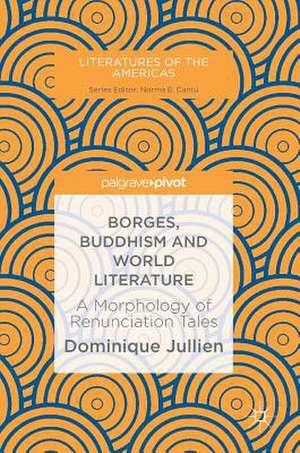Borges, Buddhism and World Literature: A Morphology of Renunciation Tales: Literatures of the Americas
Autor Dominique Jullienen Limba Engleză Hardback – 18 ian 2019
Din seria Literatures of the Americas
- 20%
 Preț: 690.23 lei
Preț: 690.23 lei -
 Preț: 386.39 lei
Preț: 386.39 lei - 15%
 Preț: 693.25 lei
Preț: 693.25 lei -
 Preț: 388.72 lei
Preț: 388.72 lei -
 Preț: 451.48 lei
Preț: 451.48 lei -
 Preț: 388.72 lei
Preț: 388.72 lei - 15%
 Preț: 641.85 lei
Preț: 641.85 lei - 9%
 Preț: 627.85 lei
Preț: 627.85 lei -
 Preț: 387.75 lei
Preț: 387.75 lei - 15%
 Preț: 469.55 lei
Preț: 469.55 lei -
 Preț: 382.95 lei
Preț: 382.95 lei - 15%
 Preț: 637.10 lei
Preț: 637.10 lei - 15%
 Preț: 583.13 lei
Preț: 583.13 lei -
 Preț: 377.95 lei
Preț: 377.95 lei -
 Preț: 350.12 lei
Preț: 350.12 lei -
 Preț: 388.72 lei
Preț: 388.72 lei -
 Preț: 418.07 lei
Preț: 418.07 lei - 15%
 Preț: 640.37 lei
Preț: 640.37 lei -
 Preț: 381.00 lei
Preț: 381.00 lei -
 Preț: 388.13 lei
Preț: 388.13 lei - 15%
 Preț: 641.53 lei
Preț: 641.53 lei -
 Preț: 418.29 lei
Preț: 418.29 lei -
 Preț: 449.35 lei
Preț: 449.35 lei -
 Preț: 384.70 lei
Preț: 384.70 lei - 15%
 Preț: 465.98 lei
Preț: 465.98 lei -
 Preț: 422.90 lei
Preț: 422.90 lei -
 Preț: 384.48 lei
Preț: 384.48 lei - 15%
 Preț: 639.41 lei
Preț: 639.41 lei -
 Preț: 450.88 lei
Preț: 450.88 lei - 18%
 Preț: 726.06 lei
Preț: 726.06 lei - 15%
 Preț: 586.23 lei
Preț: 586.23 lei - 9%
 Preț: 758.26 lei
Preț: 758.26 lei - 15%
 Preț: 584.26 lei
Preț: 584.26 lei -
 Preț: 387.75 lei
Preț: 387.75 lei -
 Preț: 384.48 lei
Preț: 384.48 lei
Preț: 384.70 lei
Nou
Puncte Express: 577
Preț estimativ în valută:
73.61€ • 78.72$ • 61.38£
73.61€ • 78.72$ • 61.38£
Carte tipărită la comandă
Livrare economică 18 aprilie-02 mai
Preluare comenzi: 021 569.72.76
Specificații
ISBN-13: 9783030047160
ISBN-10: 3030047164
Pagini: 103
Ilustrații: XXV, 126 p. 1 illus.
Dimensiuni: 148 x 210 mm
Greutate: 0.34 kg
Ediția:1st ed. 2019
Editura: Springer International Publishing
Colecția Palgrave Macmillan
Seria Literatures of the Americas
Locul publicării:Cham, Switzerland
ISBN-10: 3030047164
Pagini: 103
Ilustrații: XXV, 126 p. 1 illus.
Dimensiuni: 148 x 210 mm
Greutate: 0.34 kg
Ediția:1st ed. 2019
Editura: Springer International Publishing
Colecția Palgrave Macmillan
Seria Literatures of the Americas
Locul publicării:Cham, Switzerland
Cuprins
1. Introduction: Leaving the Palace.- 2. A Borgesian Morphology: Renunciation, Morphology and World Literature.- 3. A Lesson for the King: Renunciation and Politics.- 4. From Ascetic to Poet: Poetic Renunciation.- 5. Modernity’s Enigmatic Parables of Renunciation.- 6. Conclusion: Renunciation Stories and Wandering Kings.
Notă biografică
Dominique Jullien is Professor of Comparative Literature and French Studies at the University of California, Santa Barbara, USA, with previous appointments at Columbia University, Harvard University, and Saint-Gallen University. She has published widely on Borges, Proust (Proust et ses modèles), travel narratives (Récits du Nouveau Monde), and East-West relations (Les Amoureux de Schéhérazade).
Textul de pe ultima copertă
This book follows the renunciation story in Borges and beyond, arguing for its centrality as a Borgesian compositional trope and as a Borgesian prism for reading a global constellation of texts. The renunciation story at the heart of Buddhism, that of a king who leaves his palace to become an ascetic, fascinated Borges because of its cross-cultural adaptability and metamorphic nature, and because it resonated so powerfully across philosophy, politics and aesthetics. From the story and its many variants, Borges’s essays formulated a 'morphological' conception of literature (borrowing the idea from Goethe), whereby a potentially infinite number of stories were generated by transformation of a finite number of 'archetypes'. The king-and-ascetic encounter also tells a powerful political story, setting up a confrontation between power and authority; Borges’s own political predicament is explored against the rich background of truth-telling renouncers. In its poetic variant, the renunciation archetype morphs into stories about art and artists, with renunciation a key requirement of the creative process: the discussion weaves in and out of Borges to highlight modern writers’ debt to asceticism. Ultimately, the enigmatic appeal of the renunciation story aligns it with the open-endedness of modern parables.
Caracteristici
Breaks new ground by contextualizing the vital link between Buddhism and Borges’s theory of literature Offers a new way of thinking about the Borgesian features of contemporary writing Appeals to readers across the fields of literature, philosophy, and politics
